Student Village Academy › Forums › GENERAL DISCUSSIONS › The Day of the Dead is what? A gathering to honor the departed and the living
Tagged: day of the dead, haloween
- This topic is empty.
-
AuthorPosts
-
-
November 2, 2022 at 8:54 PM #42676
 justseyiKeymaster
justseyiKeymasterThe Day of the Dead is what? A gathering to honor the departed and the living
Tradition holds that the heavens open on the Day of the Dead, allowing the dead to momentarily visit the earth.
The most significant fiesta in Mexico is held every year when people congregate in cemeteries to honor their deceased family members. Tradition holds that when the skies open, the spirits of the deceased return to the earth.
What you should know about the Day of the Dead is as follows:
The Day of the Dead is what?
It goes beyond a single day. Families actually call back the spirits of their deceased relatives for a brief reunion during this two-day event, which is customarily held on November 1 and 2. Food, beverages, and even toys are placed at altars to tempt the visiting souls.
It is celebrated rather than observed as a solemn occasion since it is thought that the living and the dead can communicate at this time.
“This is a celebration. The sadness is there when our relatives died, but during this day, we have to show them that we remember them with happiness,” Yoroslay Delgado told Al Jazeera.
“We dance, we sing – they need to feel they are welcome.”
The festivities could also start on October 28, depending on the location, and some places observe the day on November 6.
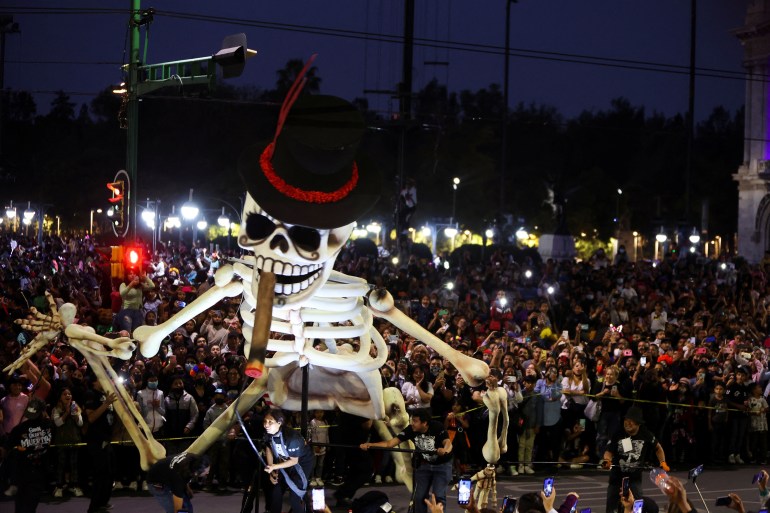
Who observes Day of the Dead festivities?
It is a national holiday in Mexico, but it is also observed in other regions of the Americas, including Spain, the Philippines, and Latin America.
What inspired the celebration?
The event is thought to have originated from Indigenous cultures thousands of years ago as a pre-Hispanic custom.
Death was temporary in the eyes of the Aztecs, and the afterlife was not final. Some experts assert that these customs were included in the Catholic calendar following the arrival of the Spaniards in the 16th century and are currently observed in conjunction with All Souls’ Day.
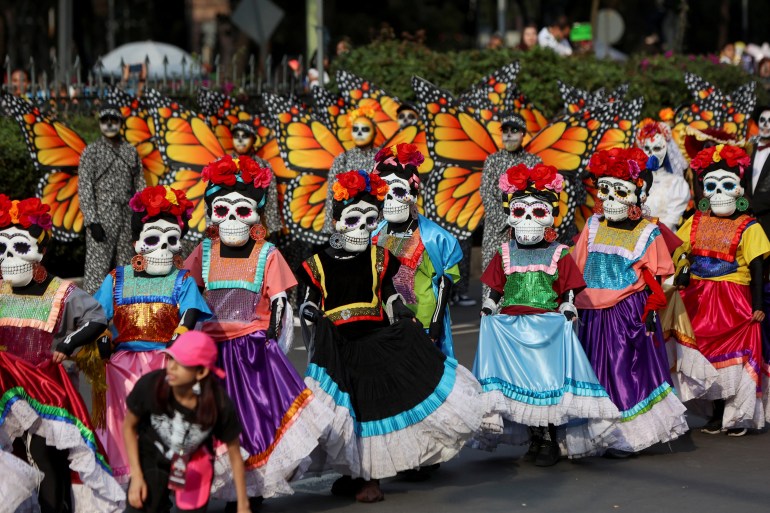
How is the holiday observed?
Many families in Mexico will spend November 1 honoring the kids, sometimes known as “angelitos” (little angels), by placing toys and balloons on their graves. They will observe All Souls Day, a holiday honoring adults who have passed away, on November 2.
To honor their loved ones, families erect “ofrendas” (altars) on their graves. Additionally, they utilize marigolds known as cempasuchil flowers, which are thought to help guide the spirits of the deceased back to their homes in the family cemetery.
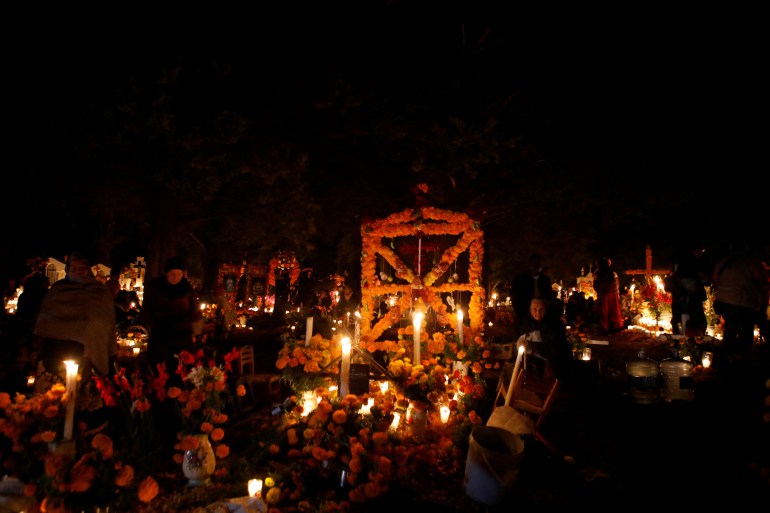
Others write short, satirical poems, also known as “calaveras” (skulls), which are epitaphs of friends that describe their interesting habits and are peppered with funny anecdotes.
The skull, which represents the cyclicity of life, is a predominant symbol of the day. Sugar or chocolate skulls can be given as gifts to both the living and the dead. Also popular is pan de muerto, a bread made in different shapes, often decorated with white frosting to represent the image of twisted bones.
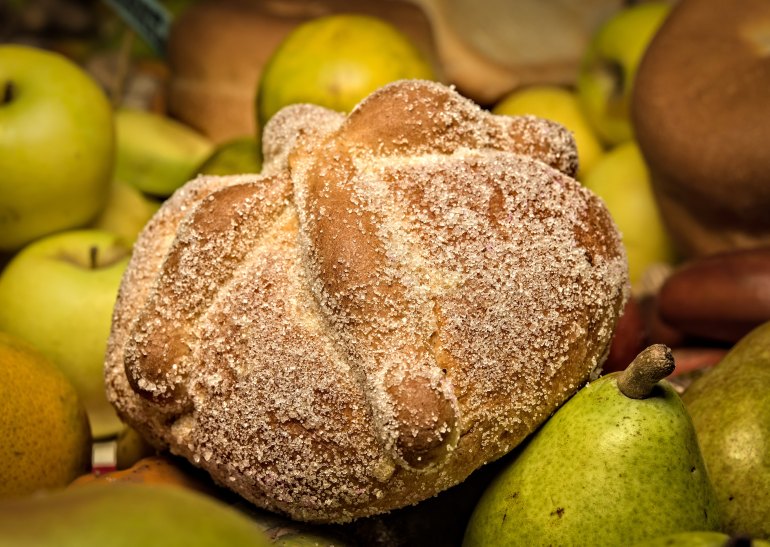
A loaf of pan de muerto (bread of the dead) is placed as an offering, on an altar at a cemetery, during the commemoration of the Day of the Dead in Mexico City [File: Omar Torres/AFP] How are the altars (ofrendas) built?
The altars are an important element during the celebration as they show the souls the way home, while they also include elements that honour and please the departed.
The altars usually include photos of the visitors. They can have two levels to symbolise heaven and earth, a third level to represent purgatory or seven levels to the steps to go to heaven.
The altars include a representation of the four elements. Water is meant to satisfy the thirst of those visiting; fire burning in candles whose light guides the deceased’s spirit; earth is present in food and other items that are special for the dead; and air is represented by colourful paper cut into designs .
Some altars include salt, which is believed to help those departing during the afterlife journey.
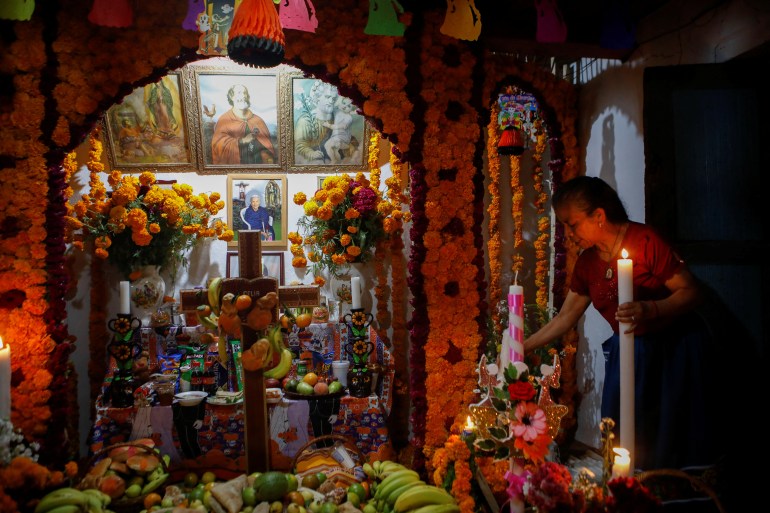
-
-
AuthorPosts
- You must be logged in to reply to this topic.

